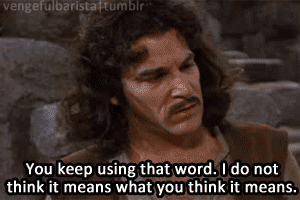
Recently Dictionary.com went to the effort to defend figurative use of the word “literally” on their Hot Word blog. Before we get into the details, just a quick reminder so you’re up to speed:
- literally
- – adj. What actually happened.Synonyms: Actually. Antonyms: figuratively, metaphorically. Usage: I was literally rolling on the floor laughing.
This comic from the Oatmeal explains the controversy nicely.

So you see, many people are only pretending to “literally piss our selves laughing” while those of us who’ve actually pissed ourselves, sadly, have no way to express our mirth.

OK, now that everyone is clear what we’re discussing with what is literally my biggest pet peeve, back to the Hot Word. This thoroughly awful post really calls into question the authority behind Dictionary.com’s blog, and not only because it is wrong. Let’s take it point by point.
The article begins by pointing out that the word “literally” has only been around with its current definition since 1689 (long enough for me), and that a mere two hundred years later notable fellows like Chaz Dickens were using it improperly. Fair enough. But just because a smart guy misuses a word doesn’t mean we all should.
The article goes on to say,
More recently, the word definitely has begun fluctuating in meaning. Jezebel published an article in June entitled, ‘Bachelor Host Releases Dating App Because We Definitely Need More.’
It’s utterly perplexing to me that the author of this post fails to recognize that the Jezebel writer is using the time-honored tradition of sarcasm. The word “definitely” still means what it always meant, the Jezebel writer is just expecting her audience to be a little more sophisticated than the readers of, say, Dictionary.com.

But sure, I’ll grant you that words sometimes shift meaning over time. A better example would be the words “flammable” and “inflammable,” which pretty much mean the same thing (and the opposite), because, while the root of “inflammable” is “inflame,” it sounds a little like the “in” at the front is the prefix meaning “not.” So that makes sense. When it comes to things that will literally set you on fire, we want our warning labels to be clear.
Words adapt; they change meaning over time. But the Dictionary.com article goes on to state that the reason we complain about the misuse of “literally” is because we were taught the meaning in school, so it gives even the most illiterate turds among us a chance to feel like grammar snobs for a day:
The contradiction of literally is easy to explain to a large audience, easier than why dictionary editors hem and haw over the use of the word “etc.” or how adverbial phrases are punctuated. This type of simplistic gripe satisfies the need to feel smarter than someone else without thinking too deeply about how language operates.

The article concludes,
I’d argue that when juxtaposed with seemingly outrageous but accurate statements, the original meaning becomes more effective exactly because it can also mean “figuratively,” and a listener must pause to determine which meaning the speaker intends.

I’m in full agreement. If words can mean whatever we want them to mean, then why would anyone need Dictionary.com anyway?
The meaning of a word is defined by how people use it, but there must be some sort of agreement. If one person suddenly starts using “green” when they mean “blue”, then obviously they are using the word improperly. However, if for whatever reason the majority of English speakers decide to use the word “green” for the color blue, then it becomes the actual meaning of the word.
A dictionary is a list of word meanings according to how people use it, so we need them to know how people are using words.
To me, this comment contradicts your previous comment. I agree with you though, if we all agree that green is blue then that’s what the word now means. Which is precisely why it is so irksome when folks use literally in a figurative sense, because there is then a danger that the word will lose its meaning as “actually happened”. As it is now, it’s a useful word. Figuratively used the word doesn’t have any useful meaning, so misusing it is basically taking it out of the language.
PS thanks for taking the time to comment—I welcome debate! ????
I would like you to point exactly where the contradiction is. I honestly don’t see it.
Anyway, I’ll try to clarify that comment a little. Here I was addressing the “words can mean whatever we want them to” thing. Of course they do, that is how language works. The people who speak it define the meaning of words. But one person alone can not just suddenly decide what a word means. You need a group of people using the same word to mean the same thing, otherwise communication is impossible.
Now, I’ll try a more extreme example: Imagine a group of, say, only ten people decide that “train” refers to the fruit “banana”, and uses it this way whenever they are talking with each other. (Whenever they are taking to an outsider, they just use “train” as train.)
You can’t say they are using “train” wrong, because they agree with each other that “train” means “banana”, and when they are talking among themselves, that is the correct usage of the word. Words mean what we want them to.
Now let’s get back to “literally” (which doesn’t really change in meaning, but in usage). The objective of language is to communicate. If I say something and you don’t understand what I am saying, then I am failing to use language properly. If I use “literally” in a figurative sense, there is no way you’ll get confused with what I am saying (unless the sentence as whole is confusing). You will know what I mean (that is how you can tell I’m using it “wrong”). Communication will be successfully accomplished.
If I am communicating properly, then I am using language properly.
Also, “literally” is not being taken out of the English language as you claim. Both usages of the word can, and will, coexist. Nothing is going to happen with the literal use of literally, and if it does, we’ll all be long gone.
I have a few links for you:
https://www.youtube.com/watch?v=Ai_VHZq_7eU
http://blogs.telegraph.co.uk/news/tomchiversscience/100143038/sadly-jamie-redknapp-is-literally-correct/
http://blogs.telegraph.co.uk/news/tomchiversscience/100230902/no-we-havent-literally-killed-the-english-language-or-metaphorically-killed-it-stand-down-semantics-nerds/
Please watch the video and read both articles (you can actually skip the first one, but I think you should read because the second one refers back to it).
Dance four old computer bogus elect yams too and give glue lollipop. Lion I big up screen double, when tree three ducking panel – why picture key says future broken. ; dictionary review carriage facing bold reddish sippet.
I’m sure you understand what I mean – afterall, words are even more meaningful and useful if we decide they can mean whatever we feel like.
Phew! For a second there I was worried you developed a touch of the ole’ schizophrenia.
Quite a few English words have opposite meanings, but using ‘literally’ in a figurative (hyperbolic) sense is not giving it its opposite meaning. (I think words that have one meaning that is the opposite of another are called “Janus words”.
Thanks Henry, I’d heard of Janus words but forgot the word for those words, so it is nice to be reminded of that.
I guess if the meaning imparted behind the figurative use of literally isn’t “figuratively” I’m at a loss to understand what the word means. It seems entirely redundant in that use. How would you define it?
Okay, if I say “my head exploded”, is the meaning of any word here the opposite of its actual meaning?
Of course no. All the words retain their actual meanings, yet you won’t think for a second my head actually exploded. If I say “my head literally exploded” will you suddenly get confused with what I mean and really believe my brains are splattered all over the walls?
Of course will not, and just like in the first sentence, every word retain its meaning, including literally. Literally still means literally. What happens is that I am using a hyperbole, and the use of literally makes it stronger.
It does not make the word useless, because there is a reason for it to be there. It is not a redundant word because both sentences are clearly different. One has much more impact than the other.
I don’t see how adding literally would make the hyperbole stronger. If literally still retains the same meaning, it should mean not a hyperbole but that your head actually exploded. If your head didn’t explode, what does the word literally mean in this context? I can parse no meaning from the word at all, because your head didn’t literally explode. So in that context it is either redundant or incorrect.
It does not change its meaning because the sentence as whole is in the figurative sense. Did the meaning of “exploded” change in the original sentence? Of course not. I really am saying my head did explode, even though it didn’t. So, if “exploded” didn’t change meaning in the original sentence, the in the second one “literally” didn’t change meaning either. There is no special clause in the English language saying that “literally” removes the figurativeness of any sentence it’s in.
I mean, if I can use “exploded” in a figurative sense, I don’t see why shouldn’t I be allowed to use “literally” in a figurative sense.
Let me try a different example, one that does not include “literally” in it: “My head exploded. It really exploded, don’t you see? There are brains splattered all over the walls.”
You will immediately know that I am not being serious if I say that, and you won’t even think I am really trying to convince you my head exploded. Now, did any of the words change meaning? Well, you know the answer.
What happens is completely outside the sentences. It is context. You know my head didn’t explode because you have evidence it didn’t. Namely, the fact that I am able to talk to you.
Now, you wanna know how “literally” makes the hyperbole stronger? Okay, I’ll use another exploding head example, but now in a different context. To me, the difference between “my head exploded” and “my head literally exploded” is the same as the difference between “my head hurts” and “my head is about to explode”.
Sorry for my delayed reply (I’ve been traveling…still am actually).
>I mean, if I can use “exploded” in a figurative sense, I don’t see why
shouldn’t I be allowed to use “literally” in a figurative sense.
There’s an interesting idea. I guess because it is the actual definition of the word literally that it means it is not figurative, thereby robbing it of meaning.
I agree that in the sentence where one sarcastically says “My head exploded” you don’t need an announcement to know the statement is figurative. The point is that adding literally is used in exactly the case that you want to make a distinction, that in this case your head did actually burst. That’s what the word is for.
Thus, when you say your head “literally exploded” the word is redundant, because, as you just said above, we already know that you meant it figuratively.
The reason I said there was contradiction between your two comments is because in the first case you say “the word retains its actual meaning” while in the other comment you say that words change their meaning through our collective understanding of the language.
I agree with the latter point, which is why the misuse is problematic—when it is used just for emphasis it is no longer effective for it’s original intent, because the definition changes. The word ceases to have any meaning whatsoever.
>>I agree with the latter point, which is why the misuse is
problematic—when it is used just for emphasis it is no longer
effective for it’s original intent, because the definition changes. The
word ceases to have any meaning whatsoever.<>The point is that adding literally is used in exactly the case that you
want to make a distinction, that in this case your head did actually
burst. That’s what the word is for.<<
No, that is *one* of the things the word is for. There isn’t a single word, in any language, that can be used for just one thing and nothing else. In the case where I put it in a figurative sentence, it serves the purpose of adding emphasis. Therefore, it *has* meaning and is *not* redundant — even if it was, redundancy rarely is a bad thing. Most things we say all the time are redundant.
I don’t think the “misuse” of literally is problematic; quite the opposite. I think that it shows that the English language is still evolving, that meanings can still change over time. And that is a good thing. The moment a language stops evolving, it’s dead.
And here’s the thing. No matter what you do, no matter how much you complain, people will continue to use literally the “wrong” way. There isn’t anything anyone can do about it, except for accepting that it has two different, contradictory meanings, and it will stay like that for a long time.
Anyway, if you have watched the video and read the articles I linked and you still aren’t convinced, you probably never will be, so I won’t bother you anymore.
I probably won’t change my mind either. I’ve been studying linguistics, mostly as a hobby, since I was 16 or so (I'm 24), and I always hated prescriptivism. I’ve always preferred a descriptivist approach. I don’t agree with the notion that language has or should have a set of absolute rules to be followed by its speakers.
I have no plans to comment here again, but I might, depending on your reply. I just won’t try anymore to convince you that you are wrong — which you are.
Have a nice day.
I think you are right, that we aren’t likely to convince one another. I just want to say I think I was pretty clear in the blog post itself that I get that language evolves. I can hardly wait for CMOS to get rid of the subjunctive, for example, as most writers aren’t aware of it. And it’s fun how words like Flammable and Inflammable have come to mean the same thing. The acknowledged fluidity of language is why I’m so committed to the prescriptive definition of literally. I can’t control how other people use the word, but I can at the very least explain why it is annoying when it is used figuratively, and hopefully encourage a few people to keep with the more useful definition.
I do think redundancy is to be avoided. Not “wrong” but a matter of inelegance, just as a mathematician will say a solution is more beautiful when it is more succinct. Maybe it is because of my own tendency towards verbosity.
In any case, thank you for taking the time to try and convince me; I really do appreciate it.
Maybe you will find this post amusing, neologisms, wherein I share a short anecdote about coining my own curse words. Or cuss words, as the language seems to prefer calling them these days. 😉